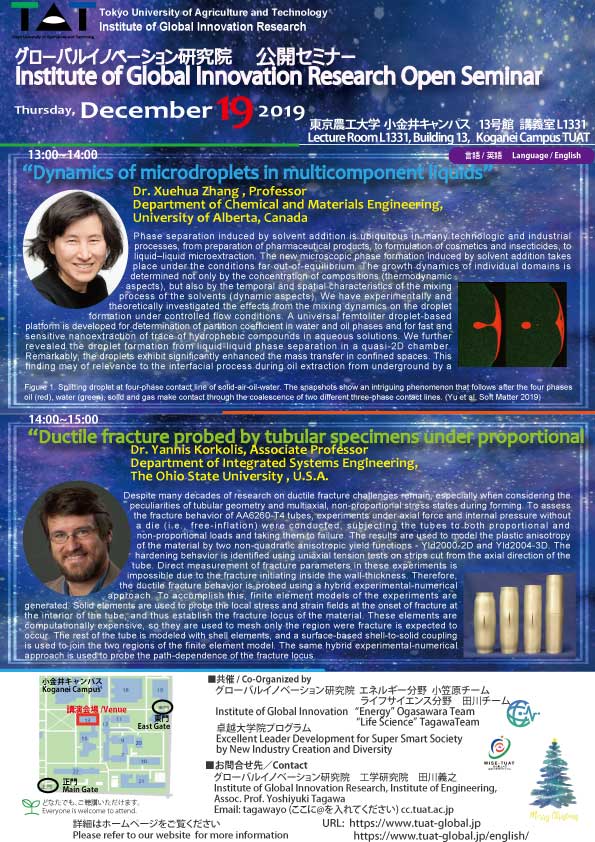イベント情報
【GIR公開セミナー】 Dr. Xuehua Zhang (University of Alberta, Canada) / Dr. Yannis Korkolis (The Ohio State University, U.S.A.)

| 日時 | 2019.12.19(13:00~15:00) |
|---|---|
| 会場 | |
| 講演タイトル | 13:00~14:00 ◆Dr. Xuehua Zhang (Professor, Department of Chemical and Materials Engineering, University of Alberta, Canada) " Dynamics of microdroplets in multicomponent liquids" 〈要旨〉 Phase separation induced by solvent addition is ubiquitous in many technologic and industrial processes, from preparation of pharmaceutical products, to formulation of cosmetics and insecticides, to liquid–liquid microextraction. The new microscopic phase formation induced by solvent addition takes place under the conditions far out-of-equilibrium. The growth dynamics of individual domains is determined not only by the concentration of compositions (thermodynamic aspects), but also by the temporal and spatial characteristics of the mixing process of the solvents (dynamic aspects). We have experimentally and theoretically investigated the effects from the mixing dynamics on the droplet formation under controlled flow conditions. A universal femtoliter droplet-based platform is developed for determination of partition coefficient in water and oil phases and for fast and sensitive nanoextraction of trace of hydrophobic compounds in aqueous solutions. We further revealed the droplet formation from liquid-liquid phase separation in a quasi-2D chamber. Remarkably, the droplets exhibit significantly enhanced the mass transfer in confined spaces. This finding may of relevance to the interfacial process during oil extraction from underground by a displacing fluid. 14:00~15:00 ◆Dr. Yannis Korkolis (Associate Professor, Department of Integrated Systems Engineering, The Ohio States University, U.S.A.) "Ductile fracture probed by tubular specimens under proportional loading" 〈要旨〉 Despite many decades of research on ductile fracture challenges remain, especially when considering the peculiarities of tubular geometry and multiaxial, non-proportional stress states during forming. To assess the fracture behavior of AA6260-T4 tubes, experiments under axial force and internal pressure without a die (i.e., free-inflation) were conducted, subjecting the tubes to both proportional and non-proportional loads and taking them to failure. The results are used to model the plastic anisotropy of the material by two non-quadratic anisotropic yield functions - Yld2000-2D and Yld2004-3D. The hardening behavior is identified using uniaxial tension tests on strips cut from the axial direction of the tube. Direct measurement of fracture parameters in these experiments is impossible due to the fracture initiating inside the wall-thickness. Therefore, the ductile fracture behavior is probed using a hybrid experimental-numerical approach. To accomplish this, finite element models of the experiments are generated. Solid elements are used to probe the local stress and strain fields at the onset of fracture at the interior of the tube, and thus establish the fracture locus of the material. These elements are computationally expensive, so they are used to mesh only the region were fracture is expected to occur. The rest of the tube is modeled with shell elements, and a surface-based shell-to-solid coupling is used to join the two regions of the finite element model. The same hybrid experimental-numerical approach is used to probe the path-dependence of the fracture locus. |
| 言語 | 英語 |
| 対象 | どなたでも、ご聴講いただけます。 |
| 共催 | グローバルイノベーション研究院 ライフサイエンス分野 田川チーム グローバルイノベーション研究院 エネルギー分野 小笠原チーム 卓越大学院プログラム |
| 開催概要 | |
| お問い合わせ窓口 | グローバルイノベーション研究院・工学研究院 田川義之 e-mail: tagawayo (ここに@ を入れてください) cc.tuat.ac.jp |
このページの上部へ